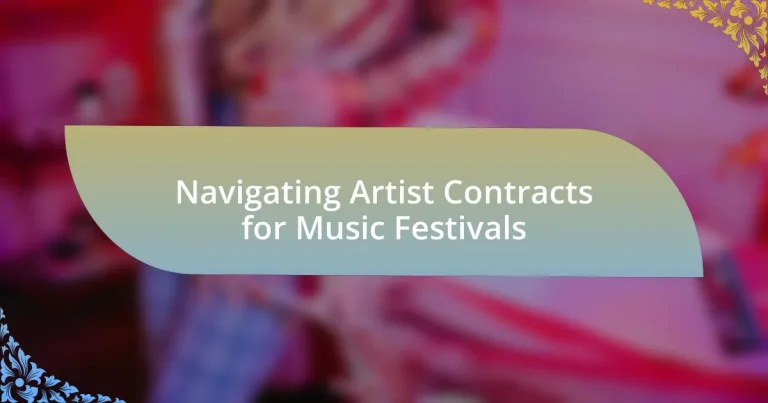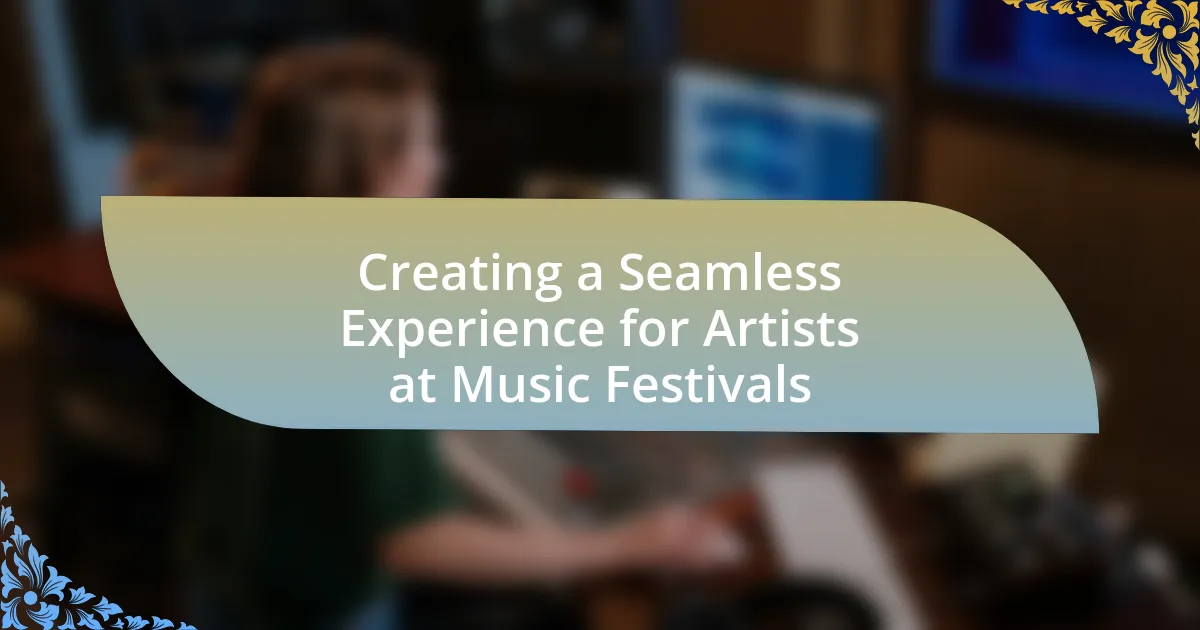Artist contracts for music festivals are essential legal agreements that define the terms of participation between festival organizers and performing artists. These contracts typically encompass performance details, payment structures, technical requirements, and rights related to the artist’s intellectual property. Understanding the intricacies of these contracts is crucial for artists to protect their interests and ensure fair compensation, while also minimizing potential disputes. The article explores the key elements of artist contracts, the differences from other contract types, the importance of legal clarity, and best practices for negotiation and compliance, providing valuable insights for artists navigating the complexities of the music festival industry.
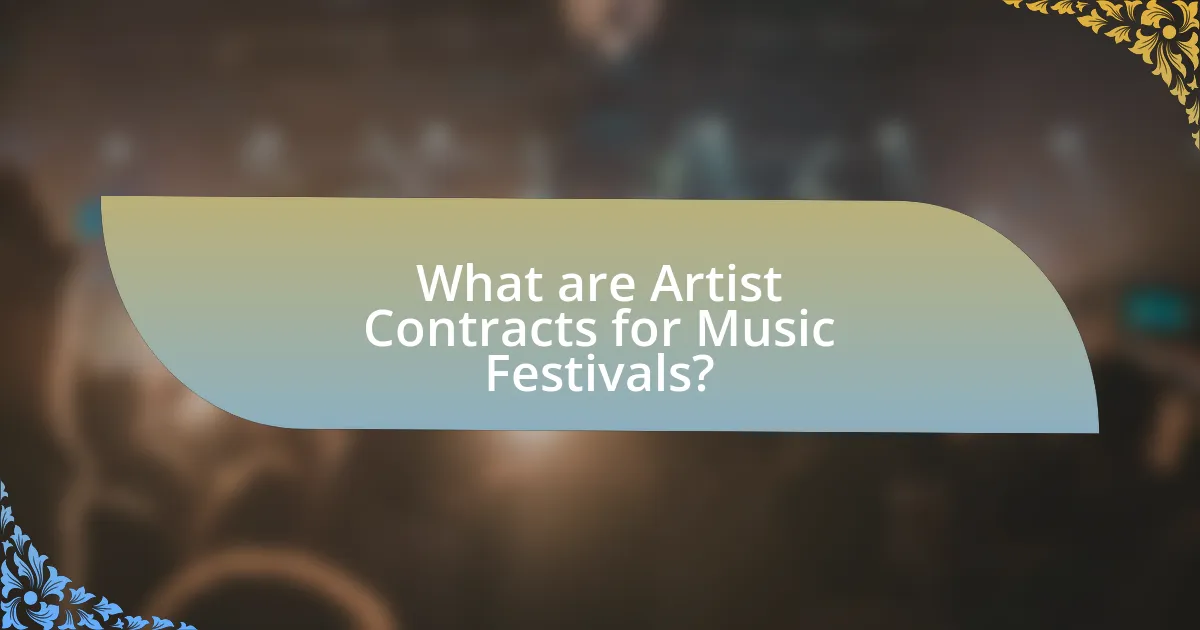
What are Artist Contracts for Music Festivals?
Artist contracts for music festivals are legal agreements between festival organizers and performing artists that outline the terms and conditions of the artist’s participation. These contracts typically include details such as performance dates, payment amounts, technical requirements, and rights regarding the use of the artist’s name and likeness. The purpose of these contracts is to ensure clarity and protect the interests of both parties, thereby minimizing the risk of disputes. For instance, a study by the International Music Managers Forum highlights that well-defined contracts can lead to smoother festival operations and better artist satisfaction.
How do Artist Contracts differ from other types of contracts?
Artist contracts differ from other types of contracts primarily in their focus on the unique rights and obligations related to creative performance and intellectual property. Unlike standard contracts, which often address goods or services in a general context, artist contracts specifically outline terms regarding performance duration, compensation, royalties, and rights to recordings or merchandise. For instance, artist contracts typically include clauses that protect the artist’s creative control and specify how their work can be used, reflecting the importance of intellectual property in the entertainment industry. This specificity is crucial, as it ensures that both the artist and the promoter understand their rights and responsibilities, which can vary significantly from traditional business agreements.
What key elements are typically included in Artist Contracts?
Artist contracts typically include key elements such as payment terms, performance details, rights and ownership, cancellation policies, and liability clauses. Payment terms specify the amount and method of compensation for the artist’s performance. Performance details outline the date, time, duration, and specific requirements for the show. Rights and ownership clauses clarify the use of the artist’s image, music, and any recordings made during the event. Cancellation policies define the conditions under which either party can cancel the contract and the consequences of such actions. Liability clauses address the responsibilities of both the artist and the event organizers in case of accidents or damages. These elements are essential for protecting the interests of both parties involved in the contract.
Why is it important to understand the terms of an Artist Contract?
Understanding the terms of an Artist Contract is crucial because it defines the rights, responsibilities, and expectations of both the artist and the event organizers. Clear comprehension of these terms helps artists avoid potential legal disputes, ensures fair compensation, and clarifies performance obligations. For instance, a study by the Music Industry Research Association highlights that artists who thoroughly understand their contracts are less likely to face conflicts regarding payment and performance conditions, leading to more successful collaborations.
What roles do Artist Contracts play in music festivals?
Artist contracts play a crucial role in music festivals by outlining the terms and conditions under which artists perform. These contracts define the expectations for both the festival organizers and the artists, including performance fees, set times, technical requirements, and accommodations. For instance, a well-structured contract ensures that artists receive agreed-upon compensation, which can range from thousands to millions of dollars depending on their popularity and the festival’s scale. Additionally, artist contracts often include clauses related to liability, cancellation policies, and intellectual property rights, protecting both parties legally. This structured agreement is essential for minimizing disputes and ensuring a smooth operational flow during the festival, as evidenced by the fact that many festivals rely on these contracts to manage logistics and artist relations effectively.
How do Artist Contracts protect the interests of both artists and festival organizers?
Artist contracts protect the interests of both artists and festival organizers by clearly outlining the rights, responsibilities, and expectations of each party. These contracts specify performance details, payment terms, and logistical arrangements, ensuring that artists receive fair compensation and that organizers can effectively plan the event. For instance, contracts often include clauses regarding cancellation policies, technical requirements, and promotional obligations, which help mitigate risks for both sides. By establishing these terms, artist contracts create a legal framework that reduces misunderstandings and potential disputes, thereby fostering a collaborative environment essential for successful music festivals.
What are the potential consequences of not having a proper Artist Contract?
Not having a proper Artist Contract can lead to significant legal and financial consequences for both the artist and the event organizers. Without a contract, there is no formal agreement outlining the terms of performance, payment, and rights, which can result in disputes over compensation, performance expectations, and intellectual property rights. For instance, artists may not receive agreed-upon fees, or they may face last-minute changes to performance conditions that were not documented. Additionally, the absence of a contract can expose both parties to liability issues, as there is no clear delineation of responsibilities and obligations. This lack of clarity can lead to costly legal battles, damage to reputations, and loss of future opportunities in the music industry.
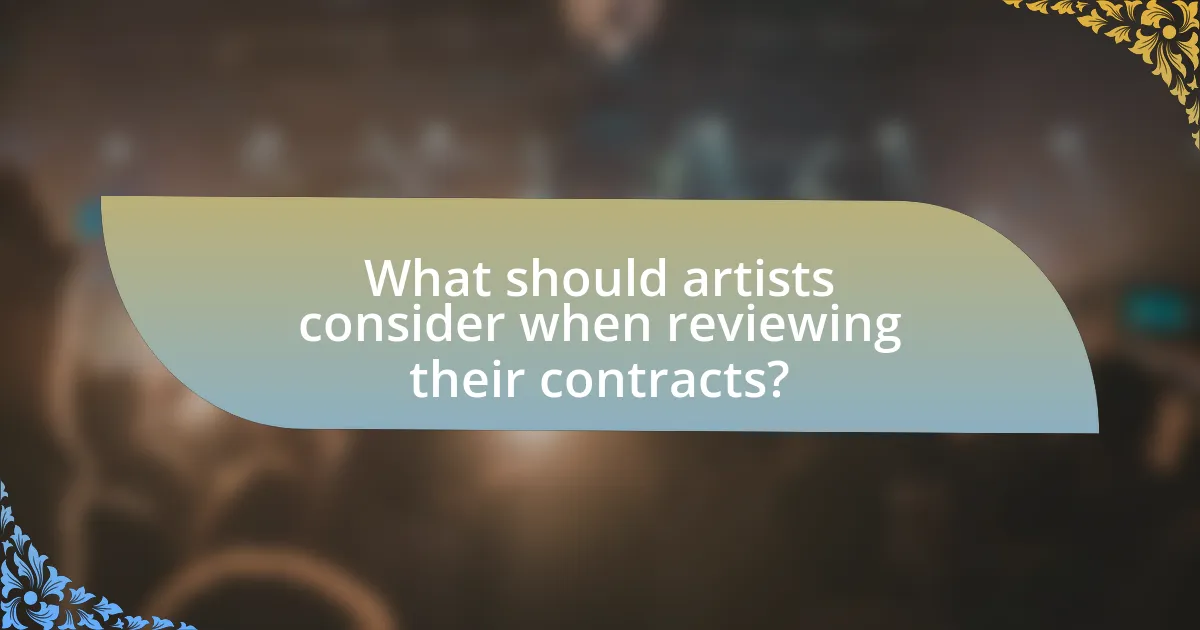
What should artists consider when reviewing their contracts?
Artists should consider the terms of compensation, including payment structure and timing, when reviewing their contracts. Understanding how and when they will be paid is crucial for financial planning. Additionally, artists should examine clauses related to performance obligations, such as set length and technical requirements, to ensure they can meet the expectations set forth. Rights regarding intellectual property, including ownership of recordings and merchandise, must also be scrutinized to protect their creative work. Furthermore, cancellation policies and force majeure clauses are important to understand, as they outline the consequences of unforeseen events. Lastly, artists should review any exclusivity agreements that may limit their ability to perform elsewhere, as these can significantly impact their career opportunities.
How can artists identify red flags in their contracts?
Artists can identify red flags in their contracts by closely examining specific clauses that may indicate unfavorable terms. Key areas to scrutinize include payment structures, rights to intellectual property, cancellation policies, and exclusivity agreements. For instance, contracts that require artists to forfeit rights to their music or grant extensive control to promoters can be problematic. Additionally, vague language regarding payment timelines or conditions for cancellation can signal potential issues. According to the American Bar Association, artists should also be wary of clauses that impose unreasonable penalties or obligations, as these can lead to significant financial and legal repercussions.
What common pitfalls should artists avoid in their contracts?
Artists should avoid vague language in their contracts, as it can lead to misunderstandings regarding rights and obligations. Clear definitions of terms, such as “performance,” “compensation,” and “intellectual property,” are essential to prevent disputes. Additionally, artists must be cautious of exclusivity clauses that may limit their ability to perform elsewhere, potentially impacting their income. Another common pitfall is neglecting to review payment terms, which can result in delayed or insufficient compensation. Artists should also avoid signing contracts without legal consultation, as professional guidance can identify unfavorable terms and protect their interests.
How can artists negotiate better terms in their contracts?
Artists can negotiate better terms in their contracts by conducting thorough research on industry standards and leveraging their market value. Understanding typical compensation rates, performance expectations, and rider requirements allows artists to present informed arguments during negotiations. For instance, a study by the Music Industry Research Association found that artists who are well-prepared and knowledgeable about their worth can secure contracts that are 20-30% more favorable than those who do not engage in such preparation. Additionally, artists should consider collaborating with experienced managers or legal advisors who can provide insights and strategies tailored to their specific situation, further enhancing their negotiating power.
What are the financial aspects of Artist Contracts?
The financial aspects of artist contracts primarily include compensation, payment terms, and additional expenses. Compensation typically refers to the agreed fee for the artist’s performance, which can vary based on factors such as the artist’s popularity, the event’s scale, and the expected audience size. Payment terms outline when and how the artist will receive their fee, often specifying a deposit upfront and the balance after the performance. Additional expenses may cover travel, accommodation, and technical requirements, which are sometimes reimbursed by the festival organizers. These financial elements are crucial for ensuring clarity and mutual agreement between artists and organizers, thereby minimizing disputes and fostering successful collaborations.
How are payment structures typically outlined in Artist Contracts?
Payment structures in artist contracts are typically outlined through specific clauses detailing compensation methods, payment schedules, and conditions for payment. These contracts often specify whether artists will receive a flat fee, a percentage of ticket sales, or a combination of both. Additionally, payment schedules may include upfront deposits, milestone payments, or final payments upon completion of the performance. For instance, it is common for contracts to stipulate that a certain percentage of the total fee is paid in advance to secure the booking, with the remainder due after the performance. This structured approach ensures clarity and protects both the artist and the promoter, as evidenced by standard practices in the industry where contracts are designed to mitigate financial risks for both parties.
What additional costs should artists be aware of when performing at festivals?
Artists should be aware of several additional costs when performing at festivals, including travel expenses, accommodation fees, and equipment rental costs. Travel expenses can encompass flights, fuel, and transportation to and from the venue, which can vary significantly based on distance and mode of transport. Accommodation fees may arise from the need to stay overnight, especially for multi-day festivals, and can include hotel costs or rental fees for temporary lodging. Equipment rental costs can occur if artists need to rent instruments, sound systems, or other technical gear not provided by the festival. According to a survey by the Music Industry Research Association, artists often report that these additional costs can account for up to 30% of their total performance budget, highlighting the importance of budgeting for these expenses.
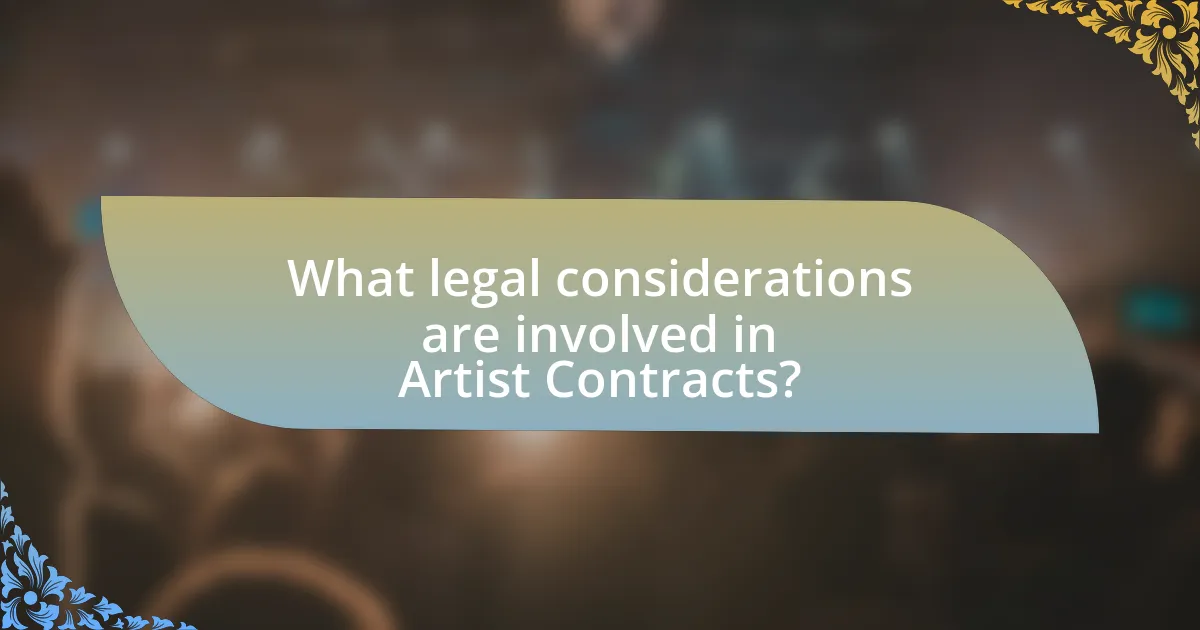
What legal considerations are involved in Artist Contracts?
Artist contracts involve several legal considerations, including intellectual property rights, payment terms, performance obligations, and liability clauses. Intellectual property rights ensure that the artist retains ownership of their creative works while granting the festival the necessary licenses for use. Payment terms specify the compensation structure, including deposits and final payments, which are crucial for financial clarity. Performance obligations outline the expectations regarding set length, technical requirements, and conduct during the event. Liability clauses protect both parties from potential legal claims arising from accidents or damages, ensuring that responsibilities are clearly defined. These considerations are essential for creating a legally binding agreement that protects the interests of both the artist and the festival organizers.
How do copyright and intellectual property rights affect Artist Contracts?
Copyright and intellectual property rights significantly influence artist contracts by determining the ownership and usage rights of creative works. These legal frameworks ensure that artists retain control over their music, lyrics, and performances, which is crucial for their financial compensation and creative integrity. For instance, contracts often specify how royalties are distributed, the rights to reproduce or distribute the work, and the duration of these rights. According to the U.S. Copyright Office, copyright protection automatically applies to original works of authorship, which means artists must clearly outline their rights in contracts to avoid disputes. This legal clarity helps protect artists from unauthorized use of their work and ensures they receive appropriate credit and compensation for their contributions.
What should artists know about exclusivity clauses in their contracts?
Artists should understand that exclusivity clauses in their contracts can restrict their ability to perform at other events within a specified timeframe or geographical area. These clauses are designed to protect the interests of promoters and ensure that the artist’s performance is unique to that particular festival or venue. For instance, an exclusivity clause may prevent an artist from performing at competing festivals within a certain radius for a set period, which can limit their earning potential and exposure. Artists should carefully review these clauses to assess the implications on their overall career and negotiate terms that allow for flexibility and additional opportunities.
How can artists protect their rights when signing contracts?
Artists can protect their rights when signing contracts by thoroughly reviewing the terms, negotiating clauses, and seeking legal advice. A detailed examination of the contract allows artists to identify any unfavorable terms, such as exclusivity or revenue sharing, that could impact their future opportunities. Negotiating specific clauses, like payment schedules and rights to their work, ensures that artists retain control over their creative output. Additionally, consulting with an attorney who specializes in entertainment law provides artists with expert guidance, helping them understand their rights and obligations, which is crucial for safeguarding their interests in the competitive landscape of music festivals.
What resources are available for artists navigating contracts?
Artists navigating contracts can access several resources, including legal aid organizations, industry associations, and online platforms that specialize in contract templates and guidance. Legal aid organizations, such as Volunteer Lawyers for the Arts, provide pro bono legal assistance specifically for artists, helping them understand contract terms and negotiate better deals. Industry associations like the American Federation of Musicians offer resources, including contract advice and educational materials tailored for musicians. Additionally, websites like Rocket Lawyer and LegalZoom provide customizable contract templates and legal information that can assist artists in drafting and reviewing contracts effectively. These resources are essential for ensuring that artists are informed and protected in their contractual agreements within the music festival industry.
How can legal professionals assist artists with their contracts?
Legal professionals can assist artists with their contracts by providing expert guidance in contract negotiation, ensuring that the terms are fair and protect the artist’s rights. They analyze contract clauses related to payment, performance obligations, and intellectual property rights, which are crucial for artists participating in music festivals. For instance, a legal professional can identify potential pitfalls in a contract, such as unfavorable cancellation policies or inadequate compensation structures, thereby safeguarding the artist’s interests. Additionally, they can help artists understand complex legal jargon, ensuring that artists are fully informed before signing agreements.
What online tools and resources can help artists understand their contracts?
Online tools and resources that can help artists understand their contracts include legal websites like Rocket Lawyer and LegalZoom, which provide templates and explanations for various contract types. Additionally, platforms such as Docracy offer a repository of legal documents, including artist contracts, that can be reviewed and customized. Educational resources like the Music Industry Blueprint and the Berklee Online Music Business course provide insights into contract terms and negotiation strategies. These resources are validated by their widespread use in the industry, helping artists navigate complex legal language and ensure they understand their rights and obligations.
What best practices should artists follow when dealing with contracts?
Artists should thoroughly read and understand all terms in a contract before signing. This includes clarifying payment structures, performance expectations, and rights to their work. Additionally, artists should seek legal advice to ensure their interests are protected, as contracts can contain complex legal jargon that may be difficult to interpret. It is also advisable for artists to negotiate terms that may be unfavorable, such as exclusivity clauses or cancellation policies. According to the American Bar Association, having a clear understanding of contractual obligations can prevent disputes and ensure a smoother collaboration.
How can artists prepare for contract negotiations effectively?
Artists can prepare for contract negotiations effectively by conducting thorough research on industry standards and understanding their own value. This preparation involves reviewing similar contracts within the music festival context to identify common terms and conditions, which helps artists set realistic expectations. Additionally, artists should clearly define their goals and priorities, such as compensation, performance requirements, and promotional obligations, to ensure they advocate for their interests during negotiations.
Furthermore, consulting with legal professionals who specialize in entertainment law can provide valuable insights and help artists navigate complex legal language. According to a study by the Music Industry Research Association, artists who engage in pre-negotiation preparation are more likely to secure favorable contract terms, highlighting the importance of being well-informed and proactive in the negotiation process.
What steps should artists take after signing a contract to ensure compliance?
After signing a contract, artists should carefully review the terms to ensure compliance. This includes understanding obligations such as performance dates, payment schedules, and technical requirements. Artists must also keep a copy of the signed contract for reference and monitor deadlines for deliverables. Regular communication with the festival organizers is essential to clarify any uncertainties and confirm arrangements. Additionally, artists should consult with a legal professional to address any complex clauses or potential issues. This approach helps mitigate risks and ensures adherence to the contract’s stipulations.
